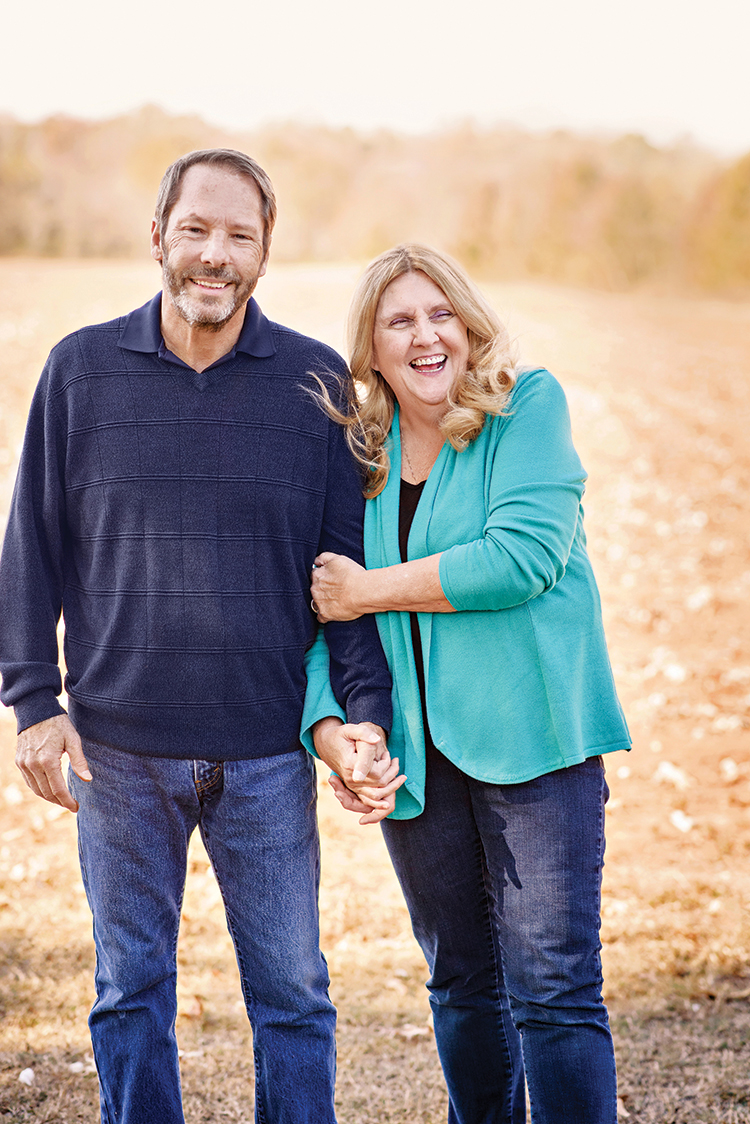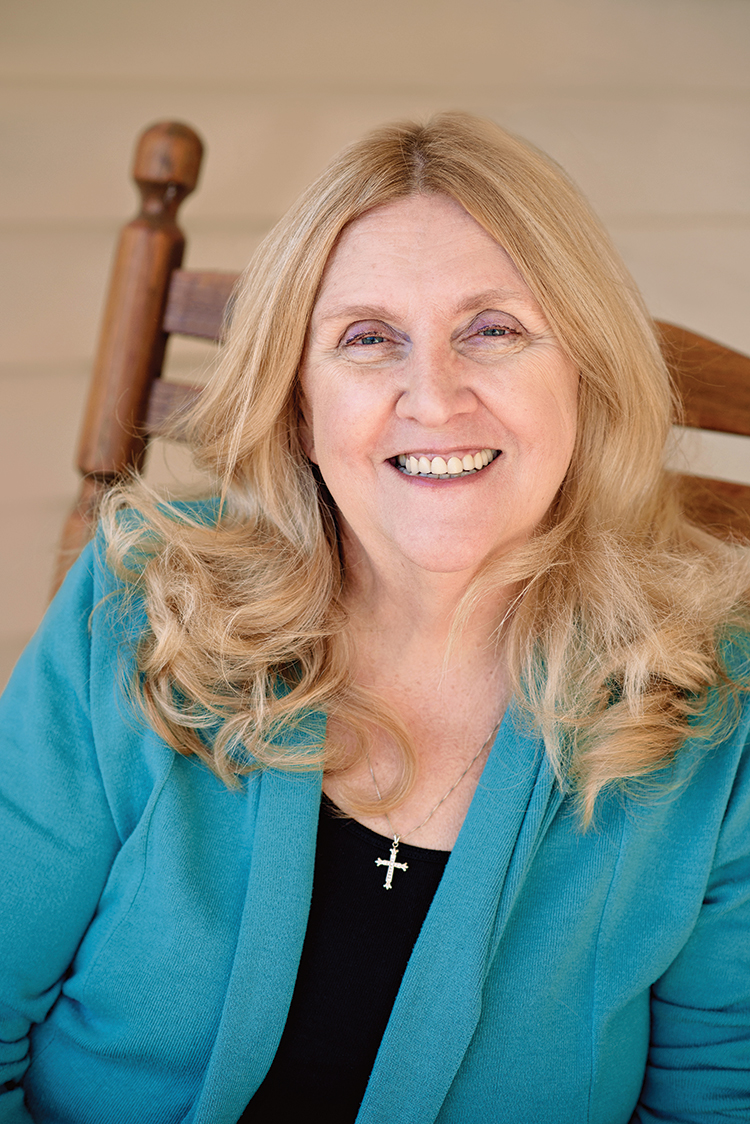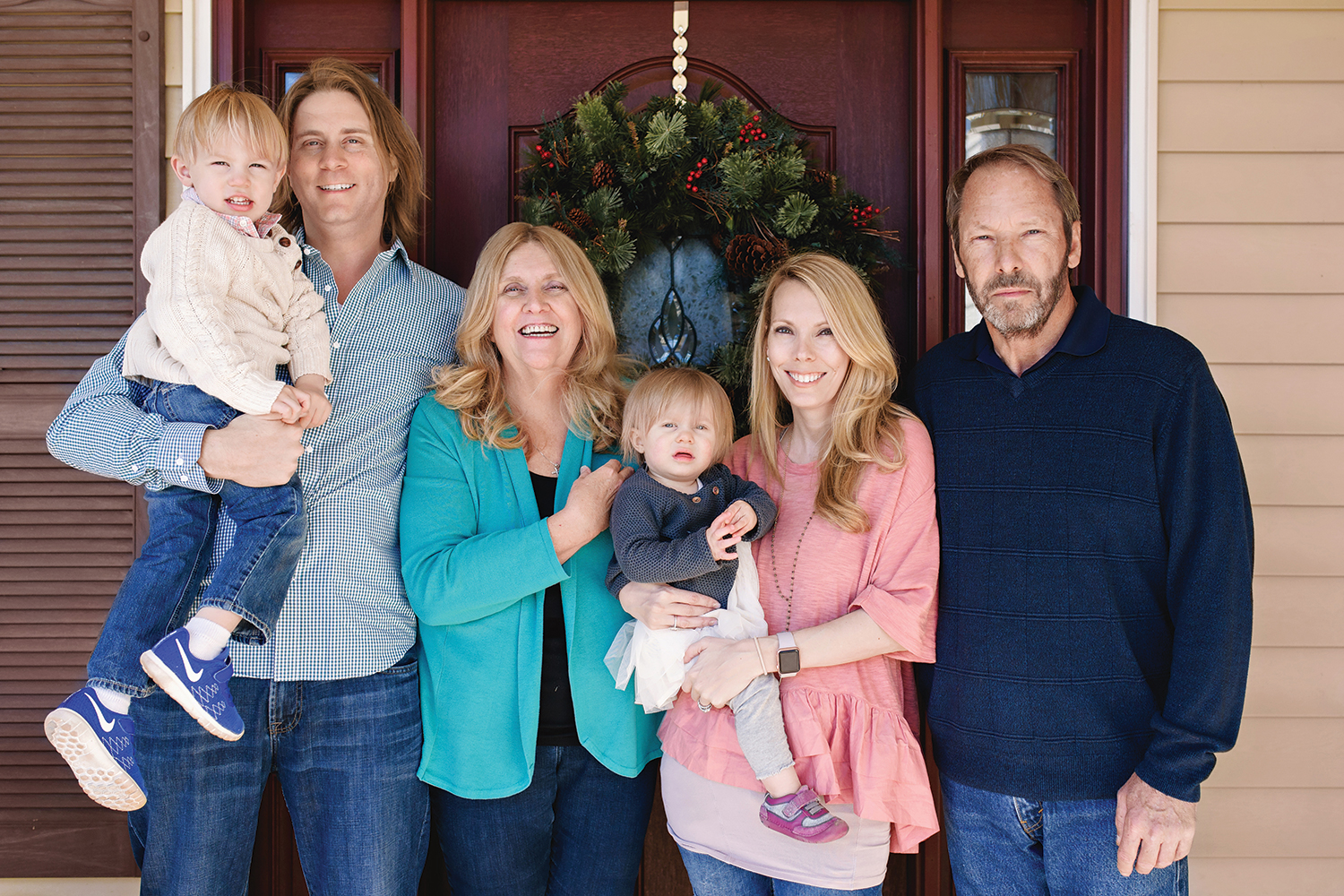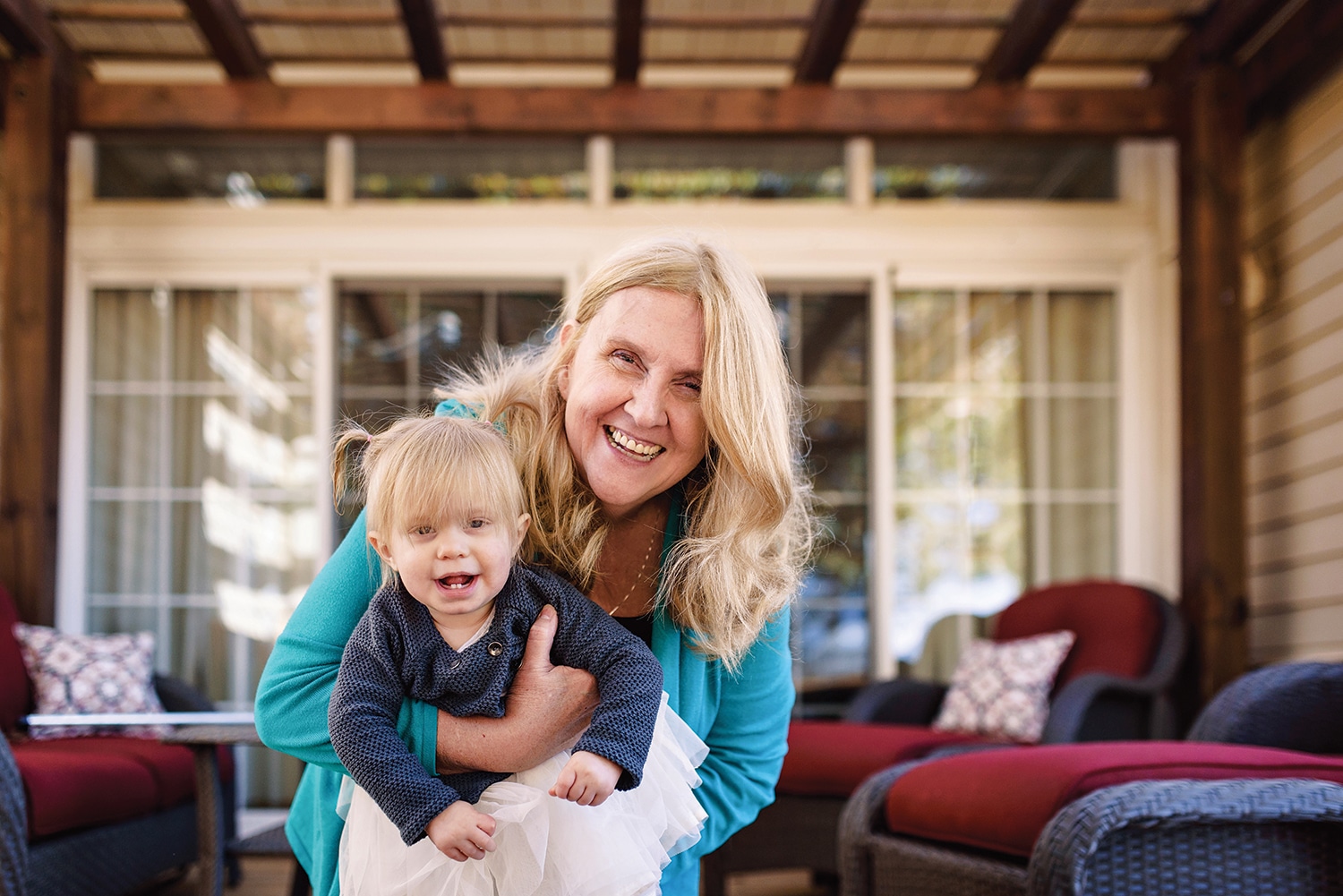WHEN SUSAN LEIGHTON entered Centenary College of Louisiana in Shreveport on a science scholarship, she thought she was on course toward a medical degree. But Leighton, now 67, found her journey rerouted, first by family commitments and then by love. Decades later, in 1997, a stage IIIC ovarian cancer diagnosis brought new challenges—and possibilities.
Leighton has shared her ovarian cancer story too many times to count. She’s spoken in rooms filled with medical students, educating them about ovarian cancer’s symptoms. She’s testified before Congress to garner support for ovarian cancer research. She’s personified hope on telephone calls with women newly diagnosed with cancer or those who have had a recurrence. Her story is backed by a vast knowledge of ovarian cancer science and bolstered by its uniqueness: There are not many 19-year ovarian cancer survivors.
A Winding Road
Leighton’s indirect path to cancer research advocacy began at Centenary and then shifted to the University of Texas at Austin, where she transferred during her junior year. Her father died in 1972, as she was starting her senior year. “My life took a turn and I went home” to Bossier City, Louisiana, “and helped my mom for a while,” says Leighton. After that, “the money had just dried up and so I was not able to finish college.”

Susan Leighton stands with her husband, Bill, outside their home. The couple met when both were serving in the U.S. Army. Photo by Lauren Sanderson
Unwilling to give up her dream of going to medical school, Leighton joined the U.S. Army in 1975, seeing it as an affordable way to continue her education. But two years into her enlistment, she says, “Once again, life threw something in my path. This time it was my husband.”
Her husband, Bill, also was in the Army. Leighton left the service and followed him to posts throughout Germany while she worked for the Army as a civilian employee. When Bill was stationed in Turkey, where family members were not permitted to live, Leighton moved back to the U.S. with their then 5-year-old daughter, Teresa, in 1983. The pair lived with her mother in Bossier City, and Leighton returned to school. While working full-time at a local hospital, she earned both a bachelor’s degree in biology and a master’s degree in counseling psychology in less than two years.
Leighton and Teresa returned to Germany to rejoin Bill in 1987. As director of civilian personnel for the Army base at Neu-Ulm, in 1991 Leighton had the task of breaking the news to 5,500 German and 800 American civilian employees that the installation would be closing and they would be losing their jobs. The same year, after the base had shut down, the family moved back to the U.S. and settled in Huntsville, Alabama. They chose the city because it had good schools and was near a military base where Bill could complete his service and retire from active duty.
Learn about the “whispering” signs of ovarian cancer.
The primary symptoms of ovarian cancer include:
- Bloating
- Pelvic or abdominal pain
- Trouble eating or feeling full quickly
- Urinary symptoms such as urgency or frequency
If you have these symptoms almost daily for more than a few weeks, you should see a doctor (preferably a gynecologist).
Other common symptoms include:
- Fatigue
- Indigestion
- Back pain
- Pain during sex
- Constipation
- Menstrual changes
- Abdominal swelling with weight loss
These symptoms are not as useful as the primary symptoms in identifying ovarian cancer because they are often caused by other conditions.
Adapted from Ovarian Cancer Symptoms Consensus Statement
A Loud Whisper
On an afternoon in June 1997, as she was getting ready for Teresa’s graduation from Grissom High School in Huntsville, Leighton, then 48, discovered the dress she planned to wear no longer fit across her stomach. Puzzled, she threw on a pair of elastic-waist pants and headed for the school stadium. There, as she and Bill climbed the steps to their seats, she found she couldn’t catch her breath. The next morning, she had indigestion, diarrhea and back pain.
Leighton went to see her family doctor, who recommended antacid medication. Then she and Teresa hit the road for a mother-daughter graduation celebration: a weekend in Nashville, Tennessee, about two hours north. The pair made it as far as the Opryland mall in Nashville. In less than an hour, they were back in the car. Leighton, who was in so much pain she couldn’t drive, handed the keys to her daughter and said, “Take me home.”
Ovarian cancer was initially dubbed “the silent killer” because it was thought to have few symptoms in the early stages and often was not diagnosed until it had reached an advanced stage. In the early 2000s, noting their shared experiences with subtle symptoms that often went misdiagnosed, ovarian cancer survivors, researchers and physicians pushed for the current description of the disease as one that “whispers—so listen.” In Leighton’s case, her cancer was whispering—loudly. But like many women then and now, her symptoms were mistaken as signs of a gastrointestinal problem. Ultimately, it was during an ultrasound of her gallbladder that a technician spotted something unusual near her ovaries.
Guidelines recommend that a gynecologic oncologist—a doctor who specializes in diagnosing and treating reproductive cancers—perform surgery on women suspected of having ovarian cancer. Leighton was referred to Ronald Alvarez at the University of Alabama at Birmingham. She says Alvarez told her to stay away from the internet, but instead she went home and immediately began searching for information on ovarian cancer treatments.
“Yes, it scared me,” Leighton says. “But I’m the kind of person who functions better when I have facts to go on. I wanted knowledge.” Impressed by her ability to dive into the research, Alvarez suggested Leighton consider becoming an ovarian cancer research advocate. This time, she followed his recommendation.
Strength and Courage
Ovarian cancer can spread throughout the abdomen. The goal of surgery—called debulking—is to see how far the cancer has spread and remove as much of it as possible. During a six-hour operation, Alvarez was able to remove about 60 percent of Leighton’s tumor. She was then treated with chemotherapy. Leighton’s daughter, Teresa Vit, a fashion designer living in Dallas, will never forget that summer after high school. “I told my mom, ‘I’m not going to college, I’m staying here,’ ” says Vit. But having had her own college plans interrupted, Leighton wouldn’t allow it. “She made me go,” her daughter says. “She was home going through chemo and it was so hard, and she made things so normal. If I could say one thing about my mom, she is the most courageous person ever. It is my mom who has made me so strong.”

Susan Leighton is a 19-year ovarian cancer survivor. Photo by Lauren Sanderson
Many would say Leighton inherited her strength from her own mother, Eileen Way. The day Leighton was diagnosed, Way, now 90, was scheduled to start radiation to treat breast cancer. “I told the doctor I wanted to postpone radiation to be there for Susan,” says Way, “but they wouldn’t. There was a big argument about that. We were both going through treatment at the same time, but mine was nothing like what Susan went through.”
Leighton received the standard treatment at the time: six cycles of Taxol (paclitaxel) and Paraplatin (carboplatin) given intravenously every three weeks. When she completed treatment in November 1997, a CT scan showed no evidence of disease (NED). In January 1998, a second-look surgery, part of the treatment protocol at the time, confirmed her NED status. All looked good for 18 months until Leighton’s CA-125 test results—a measure of the level of an ovarian cancer-linked protein—began to rise, possibly indicating her cancer had recurred. A small tumor found in her lower pelvis was removed surgically but was not cancerous. Still her CA-125 continued to rise, with no sign of another tumor. Alvarez, who is now chair of the Department of Obstetrics and Gynecology at Vanderbilt University Medical Center in Nashville, says he told Leighton, “We can either treat a number or wait until you have symptoms or we find something on a scan.” She decided to wait.
The wait lasted five years. In February 2005, Leighton began to have back pain and trouble breathing. Her CA-125 shot up. A tumor was found in her chest. (It is rare for ovarian cancer that isn’t stage IV to spread above the diaphragm.) Alvarez referred Leighton to a cardiothoracic surgeon to remove the growth, which had expanded to the size of a softball. The pathology report showed it was metastatic recurrent ovarian cancer, but it had not spread to any nearby lymph nodes. Six weeks after the tumor was removed, Leighton’s CA-125 was down to normal levels—where it has stayed for the past 11 years.
Leighton says, jokingly, that her husband chalks up her long-term survival to how ornery she is. More likely, it’s because she has endometrioid ovarian cancer, a subtype that makes up about 10 percent of all ovarian cancers. Studies show some women with this subtype tend to do better than women with most other types of ovarian cancer. Even so, subtypes alone can’t fully explain why some women with ovarian cancer do well and others don’t. Three studies on long-term ovarian cancer survivors now underway will hopefully provide some answers. Leighton worked as a patient advocate for one study and encourages other survivors to enroll in them.
How common is ovarian cancer?
- The American Cancer Society estimated that 22,280 women would be diagnosed with ovarian cancer in 2016 and 14,240 women would die of the disease.
- Ovarian cancer accounts for about 3 percent of all cancers in women.
- A woman has about a 1 in 75 chance of getting ovarian cancer in her lifetime.
- There are different types of ovarian cancer. About 85 to 90 percent are epithelial ovarian cancers, which develop in the thin layer of tissue that covers the ovaries. This type is divided into four sub-types: serous (the most common), mucinous, endometrioid and clear cell.
- Germ cell tumors, which develop in the cells that form eggs, and stromal cancers, which start in the connective tissue that holds the ovaries together, each make up about 5 percent of ovarian cancers.
- About 20 percent of ovarian cancers are found at an early stage.
- For stage I epithelial ovarian cancer, the five-year survival rate is 90 percent. For stage II, it is 70 percent. For stage III, it is 39 percent. For stage IV, it is 17 percent.
A Driven Research Advocate
The research advocacy role Alvarez suggested to Leighton was a perfect fit. Struck by how few resources there were for women like her in her community, Leighton brought together local survivors and doctors to co-found Lilies of the Valley, which offers support groups and educational programs, called Teal Talks, in northern Alabama. (Teal is the color that represents ovarian cancer.) Next, she started a legislative action team to lobby for more funding for ovarian cancer research. She also became the local coordinator for Survivors Teaching Students (STS), an Ovarian Cancer Research Fund Alliance (OCRFA) program that trains survivors and caregivers to speak to medical and other health care students about ovarian cancer.
Leighton’s national profile began to rise, and in 2009, she was asked to serve as a consumer reviewer for the Department of Defense Ovarian Cancer Research Program, evaluating researchers’ requests for funding. Word of her work and expertise continued to spread, and she was asked to do more. Today, she has a three-page résumé that includes participation in conferences presented by the American Association for Cancer Research and the American Society of Clinical Oncology. She is also a frequent flier from Huntsville to Washington, D.C., where she is a patient advocate for the National Cancer Institute Ovarian Cancer Task Force and acts as a legislative advocate leader for OCRFA.

Susan and Bill Leighton’s family gathers at their home in Huntsville. Their son-in-law, Dallas Vit, holds the Leightons’ 3-year-old grandson, Sterling. Their daughter, Teresa Vit, holds 1-year-old granddaughter, Ansley. Photo by Lauren Sanderson
In 2012, Leighton took over as the national program director for STS, which is now in 250 health care programs in 34 states and internationally. The following year, she began thinking it might be time to take a break. Then, in March 2013, following a routine mammogram, she was diagnosed with stage I breast cancer. “I was sitting in a room with four doctors and they said, ‘here are your treatment options and they’ve all got a 95 percent cure rate,’ and all I could think about was that a woman newly diagnosed with stage IIIC ovarian cancer who was sitting in this room would hear the same thing I had heard [when diagnosed with ovarian cancer in 1997]—the treatment is basically the same. I decided I had to stay involved.”
Way, Leighton’s mother, says she’s not surprised by what her daughter has accomplished. “She’d always get hold of a project and go at it full bore,” she says. Leighton’s daughter, Vit, says she believes her mom ended up in exactly the right place. “What she is doing now is what she is meant to do,” says Vit. “She is one of the smartest people I’ve ever met. But she is also a people person. People are drawn to her.”
Regina Parker is one of those people. She met Leighton at Lilies of the Valley, when she was diagnosed with ovarian cancer in 2011. Since then, she says, Leighton has been both a mentor and a friend. “When I think of Susan, I just think of energy,” says Parker. “A ball of teal energy that is out there in the world, and you better watch out and get out of her way.”
Leighton’s commitment to her family is equally strong. She dotes on her two grandchildren, Sterling, 3, and Ansley, 1. She and her husband have logged thousands of miles touring the country in their RV. And in April 2017, they will take off on a Caribbean cruise to celebrate their 40th wedding anniversary.
“The biggest thing with Susan, and she reminds everyone of this, is that it is not about her, it is about the disease and getting the information out there,” says Bill. “When people ask me who my hero is, I say my wife.”
But Leighton is not the type to get caught up in praise. “I have told my colleagues that my plan is to retire when there are Survivors Teaching Students in all 50 states, or when I hit 70,” she says. “But when my husband heard that, he laughed hysterically.” Even if she does cut back, it’s unlikely she’ll ever fully step away from her work. “There are not many women with ovarian cancer who are well enough to do it,” she says. “It’s one of the reasons I have a hard time saying no.”
Cancer Today magazine is free to cancer patients, survivors and caregivers who live in the U.S. Subscribe here to receive four issues per year.





